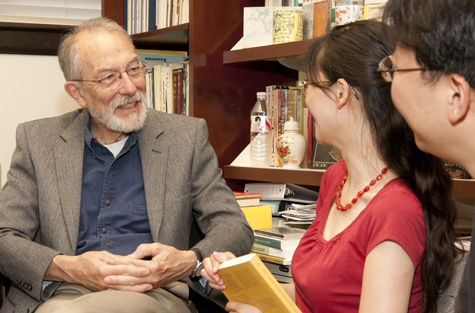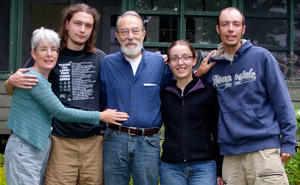
In 1957, when a Soviet satellite beat the United States into space, Robert E. Hegel was a teenager rising each morning to feed cattle on his parents’ Michigan dairy farm. Inspired by the space race, he headed for college with dreams of designing rockets.
Unlike a rocket, his career took a more circuitous route, one that would lead him to Columbia University in the heat of Vietnam War, to Taiwan for a stint as a magazine writer, and eventually to Washington University in St. Louis, where he has been a member of the faculty in Chinese since 1975.
“I went to Michigan State to study engineering and discovered fairly quickly that it didn’t matter how hard I studied calculus, I just couldn’t understand it,” Hegel says. Having breezed through Spanish and German in high school, he tried his hand at Chinese and there found his passion, albeit an equally challenging one.
“I soon realized that Chinese was very different, and much more difficult than I had imagined, but it was also fascinating,” he says. “Chinese culture was unfamiliar, yet understandable — human interests and needs being pretty much constant around the world, after all.”
A mainstay of East Asian studies in Arts & Sciences, Hegel, PhD, now serves as the Liselotte Dieckmann Professor of Comparative Literature and chair of the newly established Department of East Asian Languages and Cultures.
For Hegel, Chinese language and literature offers ongoing opportunities to explore a fascination he has held since childhood — the universal love of storytelling.
“I was fortunate to grow up in a community and a family where people were always telling stories,” he says, “stories of personal experiences, or stories about how you should and shouldn’t do things, and mistakes that people have made — occasionally successes, but mostly stories about what to avoid in this world.”
Years later, it is storytelling — and more particularly, how human experiences are expressed and recorded through written words and illustrations — that unifies his teaching and scholarship.

Courtesy photo
Robert E. Hegel (center) and his family enjoy time at his vacation home on Tilden Pond in Belfast, Maine. From left: his wife, Jane, a high-risk obstetrical nurse at Barnes-Jewish Hospital; son Paul, 22; Robert; daughter Alexandra, 29; and son Peter, 31, a WUSTL alumnus. Not pictured is his daughter Elizabeth, 43, a WUSTL alumna.
‘A first-rate mind’
Hegel studies the fiction of late imperial China, especially 1500 to 1900 when the novel and short story came of age.
His first book, The Novel in Seventeenth Century China, examines novels written during the transition between China’s last two dynasties; his second, Reading Illustrated Fiction in Late Imperial China, explores the development of reading and writing and the commercialization of print culture.
His most recent books evolved from months in Beijing spent sifting through centuries-old legal filings in China’s imperial archives. Hegel hoped written testimony might reveal dialectical variations as used by ordinary people of the era. Instead, he found himself captivated by the real-life tales of China’s least distinguished citizens.
His latest book, True Crimes in Eighteenth-Century China: Twenty Case Histories, translates and examines their tragic stories — crimes of passion, family conflict, neighborhood feuds, gang violence and sedition, all ending in homicide.
At WUSTL, Hegel has chaired the Department of Asian and Near Eastern Languages & Literatures and the Committee on Comparative Literature, both in Arts & Sciences. He has been recognized with the university’s Founders Day Award and several student-mentoring awards.
“He’s very generous in giving a frank accounting of his own experiences and choices, in a way that’s always stimulating and nurturing, never calculating,” says doctoral candidate Alexander Wille.
When Wille still was choosing a doctoral program, he sent emails to Hegel and to a prospective adviser at another university, asking each what they wish they’d known at similar points in their academic careers. The other adviser’s response was cool and terse.
“Hegel, on the other hand, sent a long, marvelously thoughtful reflection on the role of a graduate degree, how it affects one’s future, and so on,” Wille says. “From then on, it was clear where I ought to go.
“I’ve come to realize that I truly won the lottery with Hegel.”
With Hegel, winning the lottery can be a lot of work. He is known for returning draft after draft of research papers filled with marginalia.
“He’s incredibly intelligent and knowledgeable — in a very subtle, unassuming, Midwestern sort of way,” Wille says. “He has a truly first-rate mind, but he never rubs your face in it.”
Hegel tends to back up his mild admonishments with remarkable suggestions, introducing ideas that help students turn term papers into conference presentations. Often, it’s at those conferences that his students (and his colleagues) begin to understand Hegel’s standing in the field.
“Finding fans of Bob Hegel in China was a real eye-opener for me,” says WUSTL colleague James Wertsch, PhD, another Midwestern farm boy who now is the Marshall S. Snow Professor in Arts & Sciences. “Sometimes, it takes a trip far from home to appreciate the quality of faculty colleagues we have right here.”
Experience outside the library
Hegel credits his own colleagues and advisers, as well as Uncle Sam, with helping him make the journey from milking barn to academe. Too broke to afford graduate studies on his own, Hegel was advised to apply for a government program then offering support for Americans pursuing advanced study in “critical” languages, including Chinese.
In 1965, he entered Columbia University as a recipient of a generous National Defense Foreign Language fellowship, which paid full tuition and “just enough to get by in New York City,” he says.
“That was the age — an age sadly now gone — when the legacy of J. William Fulbright’s internationalism was very, very clear,” Hegel says.
He notes that “his generation” of cultural scholars is dominated by Americans who studied through the generosity of the American people and the insight of former Sen. Fulbright, adding, with some dismay, that this “funding is all dried up now.”
At Columbia, Hegel joined other students in protests over U.S. bombing in Cambodia and Columbia’s planned expansion into Morningside Park in Harlem. He was there for the big antiwar demonstrations in 1968.
After completing his graduate coursework, Hegel headed for Taiwan, where, to make ends meet, he took a job researching and writing travel pieces for the China Airlines inflight magazine. The experience proved central to his academic career, forcing him to learn about Chinese culture outside the library while vastly improving his spoken language skills.
He returned to academe through a teaching job at Case Western Reserve University in Cleveland, where he finished his Columbia dissertation before moving to WUSTL.
Studying ‘how to learn’
In his 36 years of teaching, Hegel has been a primary adviser for 35 doctoral students — only two of them Americans. He has had a student from Germany, one from Bulgaria, two Koreans and the rest Chinese.
“In this generation of scholars of Chinese literature in the U.S.,” he says, “there are very few Americans. The great majority are native speakers of Chinese.”
While it may seem odd for Chinese students to flock to the United States for advanced degrees in Chinese literature, Hegel says more imaginative Chinese students go abroad for an outside perspective, to learn the nuances of Western literary and comparative analysis.
“Chinese graduate students come here not so much to learn about Chinese literature but to study how to learn about Chinese literature, how to interpret and analyze Chinese literature from comparative and multidisciplinary perspectives still rare in Chinese universities,” Hegel says.
Demand for Chinese courses among WUSTL undergraduates is strong and growing, Hegel says, with more than 250 students of language in recent semesters.
Only about 50 will declare majors in the area; most simply want exposure to Chinese culture; many are pre-med. Others come from business or engineering, where students realize a few years of language study may help them land jobs tied to the Chinese economy.
Hegel, now 68, has no immediate plans to retire. He enjoys teaching too much.
His four children — two sons and two daughters — are grown and pursuing careers around the country. For now, he will continue spending summers near Belfast, Maine, where he and his wife have a small vacation home.
After all, in these days of global Internet, he still can access great collections of Chinese literature from his quiet study on Tilden Pond.
Fast facts about Robert E. Hegel
Born: Goodrich, Mich., population then about 500
Lives in: University City, Mo.
First visited China in: 1976. Few American scholars were allowed to visit the People’s Republic of China until 1980.
Hobbies: Kayaking and helping his wife move plants around the garden. As the son of a part-time carpenter, Hegel also likes to help build things, including a work shed and small room addition. “I also find happiness in work with a shovel, a hammer or with power tools,” he says.